
Toshiko Akiyoshi is a Japanese–American jazz pianist, composer, arranger, and bandleader.
Monday Michiru is a Japanese American actress, singer, and songwriter whose music encompasses and fuses a wide variety of genres including jazz, dance, pop, and soul. She is arguably best known for being a pioneer of the acid jazz movement in Japan in the early 1990s yet she has created her own unique style of music that transcends traditional definitions of the aforementioned genres.
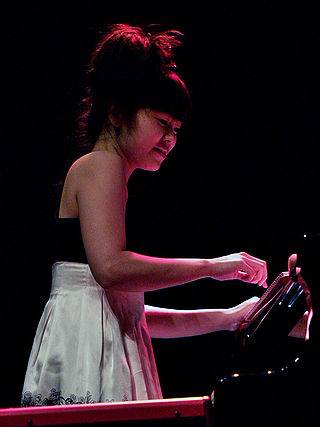
Japanese jazz is jazz played by Japanese musicians, jazz connected to Japan or Japanese culture, or both. The term often refers to the history of jazz in Japan, which has the largest proportion of jazz fans in the world, according to some estimates. Jazz was first introduced in Japan in the 1910s through transpacific ocean liners, where Filipino musicians took influences from jazz, with the Philippines being an American colony at the time. Following the music recording industry's rise in the 1920s, the lyrics of popular jazz records like "The Sheik of Araby" and "My Blue Heaven" were translated into Japanese. Jazz was associated with native counterparts to flappers and dandies in Japan, often being played in dance halls. Although considered "enemy music" in Japan during World War II, due to its American roots, the genre was far too popular for the complete ban of the music to be viable, and many disobeyed the state mandated destruction of jazz records. Following the surrender of Japan in the second World War, there was a large demand for entertainment for American troops, and jazz was particularly popular. By the 1970s, the Japanese economic miracle paved way for Japanese jazz musicians to achieve international fame, along with new musical genres such as city pop, kankyō ongaku, and japanese folk music. Japanese jazz musicians also began to evolve past Blue Note mimicry, and instead experimented with free jazz, fusion funk, and bebop, among others. This furthered the distinct sound of Japanese jazz. During the 1980s, digital music technology began to influence the Japanese jazz scene.
Hiroshima is the capital of Hiroshima Prefecture and the largest city in the Chūgoku region, Japan.

Insights is the fourth studio recording of the Toshiko Akiyoshi – Lew Tabackin Big Band and was voted "Jazz Album of the Year" in the 1978 Down Beat magazine critic's poll. It received the Swing Journal magazine 1976 Gold Disk prize in Japan and was nominated for a 1978 Grammy award in the USA for Best Jazz Instrumental Performance by a Big Band.
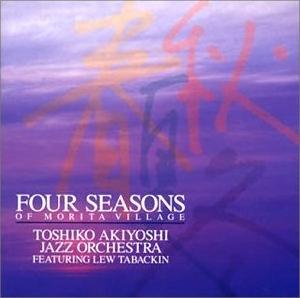
Four Seasons of Morita Village is the fifth album recorded by the Toshiko Akiyoshi Jazz Orchestra featuring Lew Tabackin. It was released in 1996 and won the Swing Journal Silver Disk Award for that year. The central "Four Seasons of Morita Village Suite" was commissioned by Morita Village in Aomori Prefecture, Japan. This recording is not to be confused with the 1990 Toshiko Akiyoshi Trio recording, Four Seasons.
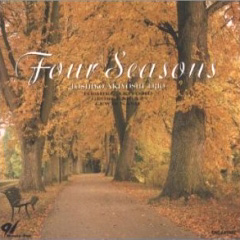
Four Seasons is a jazz album recorded by the Toshiko Akiyoshi Trio in 1990 and released on the Nippon Crown record label. It is not to be confused with the 1996 Toshiko Akiyoshi Jazz Orchestra (BMG) recording, Four Seasons of Morita Village.

The jazz big band album Hiroshima - Rising From The Abyss is the eighth audio recording released by the Toshiko Akiyoshi Jazz Orchestra featuring Lew Tabackin. It was released in 2001 by Video Arts Music in Japan and True Life in the USA. Tracks 2-7 form the "Hiroshima - Rising From The Abyss" Suite.
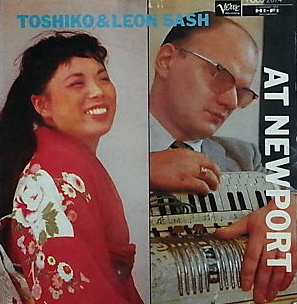
Toshiko and Leon Sash at Newport is a live album recorded at the Newport Jazz Festival in 1957 and released on the Verve record label. All 4 Toshiko Akiyoshi tracks are also included on some later re-issues of the Norgran (Verve) recording Toshiko's Piano / Amazing Toshiko Akiyoshi.

Long Yellow Road and the nearly identical release, Tosiko Akiyosi Recital [sic] is a jazz trio recording made by the pianist Toshiko Akiyoshi in Tokyo in February 1961.
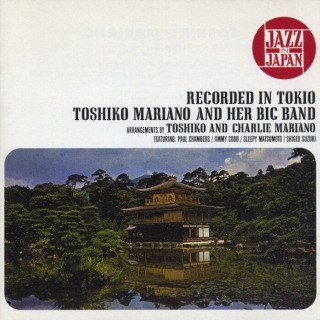
Toshiko Mariano and Her Big Band is a jazz album recorded in Tokyo by Toshiko Akiyoshi in July 1964 and released in the US on the Vee-Jay Records label. It was also released on the Nippon Columbia label in Japan under the title, Toshiko and Modern Jazz. In addition to the 4 big band arrangements featuring a full 16 piece jazz orchestra, there are also three smaller combo tracks on this album.

Tuttie Flutie is a jazz album recorded by the Toshiko Akiyoshi Trio with a flute quartet. It was released in 1980 on the Discomate (Japan) record label.

Remembering Bud: Cleopatra's Dream is a jazz trio album recorded by pianist Toshiko Akiyoshi in 1990 as a tribute to jazz pianist Bud Powell and released on the Nippon Crown record label in Japan and on the Evidence label in the USA.

Sketches of Japan is an album by jazz pianist Toshiko Akiyoshi. It was released in 1999 by Nippon Crown Records.

Shibuya Jazz Classics, Monday Michiru Collection, Toshiko Akiyoshi Issue is a compilation album of recordings by jazz pianist, composer, arranger and bandleader Toshiko Akiyoshi both in small combo and big band settings. The collection was compiled by Akiyoshi's daughter, Monday Michiru and released in Japan by Solid Records.
Since her debut recording for Norgran Records in 1954, jazz pianist, composer, arranger and big band leader Toshiko Akiyoshi has recorded continually – almost exclusively as a leader of small jazz combos and of her big bands – averaging one studio album release per year for well over 50 years. She has also recorded several live albums in solo, small combo and big band settings, including three big band concert videos. Akiyoshi has released multiple albums for Victor / BMG, Nippon Columbia, Toshiba, Discomate, Nippon Crown and other labels in Japan and for Norgran / Verve, RCA, Columbia / Sony, Concord and her own Ascent label in the US. All of her big band recordings and nearly all of her other early works have been re-issued on CDs over the years.
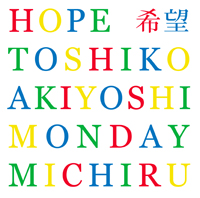
Hope is a CD single by jazz pianist Toshiko Akiyoshi and singer Monday Michiru released in Japan on the Nippon Crown Record label. The instrumental version of the song "Hope" is from the 2006 Akiyoshi album of the same name. The composition "Hope" is the closing section of Akiyoshi's "Hiroshima: Rising from the Abyss" suite, first introduced on the 2001 Toshiko Akiyoshi Jazz Orchestra album, Hiroshima - Rising From The Abyss.
希望 is a Japanese and Chinese term meaning "hope". It may refer to:

In Shanghai is a live concert recording made by the Toshiko Akiyoshi Jazz Orchestra featuring Lew Tabackin in October, 2010 in Shanghai. An audio CD version was released by Pony Canyon in Japan in January, 2011 and a DVD video version was released in March of the same year. Although the New York-based Orchestra had officially disbanded in 2003, they have reformed on occasion to perform special tours and concerts like this one.















